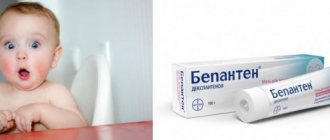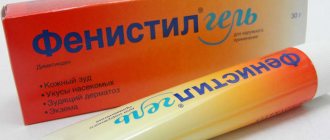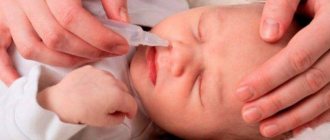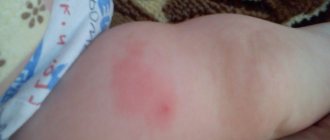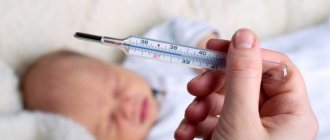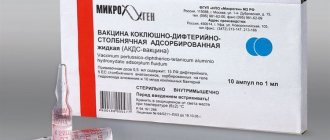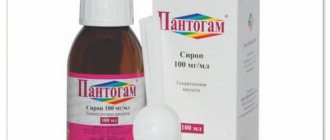The use of standard antihistamines in the treatment of children is unacceptable. One of the latest unique developments in the pharmaceutical industry is the drug Fenistil for newborns, which quickly and effectively eliminates allergic reactions of various etiologies and has earned high praise among parents and pediatricians.
Description and composition
Drops for oral administration are a colorless, transparent liquid that has almost no odor.
1 ml, which corresponds to 20 drops, contains 1 mg of dimethindene maleate.
The auxiliary components of the dosage form include:
- sodium hydrogen phosphate 12-water;
- antioxidant E330;
- macrogol;
- purified water;
- benzoic acid;
- trilon B;
- saccharin.
The medication is available in dark glass bottles, which are equipped with a dropper dispenser for convenience. The volume of the dosage form is 20 ml.
Pharmacological group
Dimetindene maleate is a histamine H1 receptor blocker, a competitive histamine antagonist. It relieves allergies, eliminates itching, and excessive capillary permeability, which is observed during an allergic reaction. It has an antibradykinin and weak m-anticholinergic effect. When taking the medication during the day, a mild sedative effect may occur.
After oral administration, the antihistamine effect of the medication begins after half an hour and reaches its maximum severity within 5 hours.
After oral administration, the active substance is rapidly absorbed. The maximum concentration in the blood is observed after 2 hours. The bioavailability of the drug reaches 70%. Up to 90% of the active substance binds to proteins and migrates well into tissues. Passing through the liver, the drug is metabolized.
The half-life reaches 6 hours. The drug is excreted through the intestines and kidneys: 90% of the active substance is excreted in the form of metabolites, the rest - unchanged.
Drops and other forms of allergy medications for newborns
How many days does the course of treatment of newborns with Fenistil last? How often and for how long does it need to be done? It is worth noting that first of all, it is worth understanding the principle of action of the drug, and then asking questions that interest a large number of parents.
The peculiarity of the drug is that it acts on receptors that are sensitive to compounds released during an allergic reaction - histamine, and blocks their functioning.
Healthy children have histamine, but it is contained inside the cells, and with pathology, in particular, upon contact with an allergen, it is released into the blood. As a result, swelling of the tissues, spasm of smooth muscles, formation of blood stagnation in the vessels, itching and similar symptoms occur.
What type of drug to give - it is sold in various forms, and in pharmacies you can find:
- Gel;
- Ointment;
- Cream;
- Syrup;
- Drops;
- Pills.
Each form has its own dosage and special instructions for use; they must be examined especially carefully when using the drug for pregnant women and, if necessary, applied to the face.
Indications for use
Fenistil drops are prescribed when:
- allergic diseases, such as nutritional and drug allergies, hay fever, year-round rhinitis of allergic etiology, Quincke's edema, urticaria;
- skin itching of various etiologies, including eczema, itchy dermatoses, for example, atopic dermatitis, itching due to viral infections (measles, rubella, chickenpox), insect bites.
In addition, drops are prescribed to prevent allergies during hyposensitizing therapy.
Indications and contraindications from the instructions for Fenistil drops for children
Dropping Fenistil is much easier than giving tablets, since not all children happily take them while taking medications and, in general, begin to be capricious. As a rule, this drug is prescribed for angioedema, allergic rhinitis, itching caused by insect bites, eczema, which is the result of an allergic reaction, urticaria, itching due to an infectious disease such as chicken pox or measles, allergic dermatosis, allergic reaction to food, hay fever, allergies to drugs, itching from burns, both household and ultraviolet.
Often the drug is prescribed before vaccination in order to carry out preventive actions, since it is necessary to support immunity during the vaccination period, especially in those infants who are predisposed to allergic reactions.
The instructions for use include not only indications, but also contraindications, which should be read as carefully as possible in order to avoid the negative effects of the medicine on the body, especially during pregnancy.
Contraindications include:
- The presence of personal intolerance to the components of the drug;
- Bronchial asthma;
- Angle-closure glaucoma.
The abstract also includes the fact that it is strictly forbidden to use the drug for infants until 1 month after birth. If babies under one year of age exhibit manifestations of pathology in the development of the respiratory tract, then this medicine is also strictly contraindicated for them, even in minimal quantities or, if urgently necessary, only under the supervision of doctors in a hospital.
Fenistil before DTP vaccination
From the beginning of life, children receive vaccinations that protect against infectious diseases. One of the first vaccinations is DPT against whooping cough, tetanus, and diphtheria. Pediatricians recommend giving Fenistil to children under one year of age before vaccination. Find out what the medicine is intended for and whether it is necessary to take additional medicine.
Why is Fenistil prescribed for children?
The majority of vaccinations that need to be given to children under three years of age have allergic side reactions. Not a single pediatrician can guarantee that the baby will be vaccinated without complications.
To exclude allergies after vaccination, the baby is prescribed Fenistil, which has antihistamine properties, a few days before. Independent use is contraindicated.
The pediatrician decides:
- how many drops of medicine does a baby need;
- how often to give the remedy;
- how to take into account the weight and general condition of a small patient.
Preparing for DPT vaccination
Vaccination of young children is not carried out without a thorough examination by a doctor. This is especially true for the first year of life.
The DTP vaccination, which must be done three times at equal intervals between 3 and 6 months, helps the child’s body develop immunity to dangerous diseases - whooping cough, tetanus and diphtheria.
Attention from parents and pediatricians will protect the baby from unwanted consequences after vaccination. Here are a few steps you need to take before getting the DTP vaccine:
- the child must undergo examination by specialized doctors;
- the results of blood and urine tests should not be abnormal;
- As prescribed, you should start taking the anti-allergenic drug Fenistil three to five days before the DTP vaccination.
Is Fenistil needed before DPT?
To prevent the child from developing an allergy after the DPT vaccination, the drug Fenistil is prescribed. The product will help prevent the appearance of rashes and skin itching.
Pediatricians prefer to prescribe this safe medicine instead of Suprastin or Tavegil, which they used previously.
TV shows with Dr. Komarovsky confirm with massive positive reviews from moms and dads that the antihistamine medicine has a beneficial effect on the child’s body without complicating the condition after DTP vaccination.
Is Fenistil always useful for children?
No matter how literate the baby’s mother is in medical matters, self-administration of any medications is strictly prohibited, even if she is sure that it is for the benefit of health.
The antihistamine drug Fenistil, which helps to better cope with the consequences of vaccination, can also provoke unpleasant reactions and has contraindications.
Uncharacteristic effects appear when there is an individual intolerance to the constituent components of the drug or the permissible dose is exceeded. An adverse reaction to Fenistil may look like this:
- excessive sleepiness;
- overexcitement;
- dizziness;
- impaired breathing with a feeling of tightness in the chest;
- nausea with vomiting;
- pain in the gastrointestinal tract;
- general swelling or at the injection site;
- abnormal blood pressure readings;
- mild cramps;
- allergies in the form of a skin rash.
It is strictly forbidden to give Fenistil to children before the DPT vaccination if:
- the baby is not yet 1 month old;
- the baby was not born full-term and did not gain the required weight appropriate for its age;
- congenital diseases of the lungs, gall bladder, glaucoma, and bronchial asthma were identified.
How to choose Fenistil for infants
The anti-allergy medicine Fenistil is available in different forms - drops, gel, capsules. Pediatricians, including the famous children's doctor Komarovsky, are clear in their advice.
Doctors recommend giving small children under one year of age drops, which are more comfortable to use than capsules. The gel is approved for use by infants: it is applied externally directly to the injection site and the surrounding area.
Fenistil is a gentler drug for children compared to other antihistamines.
Price
The price ratio for the drug in pharmacies of different categories may vary slightly. Also, the cost depends on the form of the medicine and the volume of the package. It is convenient and profitable to buy this drug in an online store, look at the catalog and order it for delivery. Here are the prices for the Fenistil range that you can use as a guide:
| Release form | Price, rubles |
| Drops, 20 ml | 710-870 |
| Gel 30 g, 0.1% | 575-720 |
| Capsules, 20 pcs., 24 mg | 1875-1995 |
How to give Fenistil to a baby
It is recommended to give the medicine in drops to small children. Your pediatrician will tell you how to give Fenistil before DPT vaccination. The doctor keeps a map of the baby’s development and can give recommendations. The dosage of Fenistil in drops for children often corresponds to the following standards:
- Up to a year. Three times a day, 4-6 drops per tongue.
- From 1 to 3 years. Three times a day, 10-15 drops, without drinking water.
Reviews
Olesya, 23 years old
Before the birth of her first child, she began watching programs with Komarovsky’s participation. I was especially interested in the topic of vaccinations. After the birth of my son, I knew about mandatory DTP and how to relieve allergies after it. The price of the recommended drops is reasonable. This is an affordable drug. The baby tolerated the first vaccination well, thanks to the anti-allergenic drug.
Svetlana, 27 years old
My birth was not very simple; my son was born with insufficient body weight. The first DPT vaccination was given a month later than expected. The doctor prescribed me to take anti-allergy medicine. I found out how much Fenistil costs in a pharmacy and when ordering online. The choice fell on the second option. The medicine helped to suppress any unwanted swelling that might have occurred.
Marina, 20 years old
When my daughter was three months old, just before the vaccination, I learned from the pediatrician that I needed to give Fenistil drops. I thought about buying it inexpensively through an online store, but I didn’t have much time to prepare, so I bought it at the nearest pharmacy. The price was not much more expensive. The drops have a pleasant smell. My daughter endured it without any negative reaction.
Ekaterina, 26 years old
I have an infant who has had minor health problems since birth. After long examinations by doctors, we were allowed to get vaccinated. To avoid rashes after DPT, the pediatrician recommended using the gel instead of Phoenixil drops. They anointed the place where the injection was given. There was no swelling or redness effect.
Source: https://med-anketa.ru/fenistil-pered-privivkoy-akds/
Contraindications
Fenistil drops are not prescribed if:
- individual intolerance to the composition of the medication;
- bronchial asthma;
- BPH;
- angle-closure glaucoma.
The drug is not prescribed to infants who are not yet 1 month old. The drug is not prescribed in the first trimester of pregnancy; starting from the 14th week of gestation, it can be prescribed when the benefit to the woman outweighs the risk to the fetus. Treatment with Fenistil drops is incompatible with breastfeeding, so during lactation it is advisable to switch the child to formula.
The drug should be prescribed with caution to persons suffering from chronic obstructive pulmonary pathologies, epilepsy, and infants aged 1 to 12 months, since their sedative effect may be accompanied by sleep apnea syndrome.
Directions for use and doses
Fenistil drops are taken orally. The dosage of the drug is selected individually depending on the age and weight of the child.
Fenistil before DTP vaccination and other vaccines: benefit or harm?
The antihistamine drug Fenistil is produced by the pharmaceutical company Novartis Consumer Health SA (Switzerland).
The gel and tablets are absolutely safe, so they are prescribed even to newborns. "Fenistil" is a symptomatic remedy that, although it does not eliminate the causes of allergies, can quickly eliminate its manifestations.
The medicine successfully eliminates:
- hives;
- eczema;
- dermatitis;
- hay fever;
- rhinitis.
Dimetindene maleate, the main component of Fenistil, is the active substance of the pharmaceutical drug, providing its sedative, anti-allergenic, antipruritic effect. Thanks to the ability of dimethindene to reduce the permeability of capillaries, the severity of allergic symptoms is sharply reduced.
Production of "Fenistil" is carried out in different forms of release. The following medicinal types are equally convenient to use:
- capsules (tablets);
- drops;
- emulsion;
- gel.
If the drug is prescribed orally, children under 12 years of age can take it exclusively in the form of drops. In other cases, Fenistil in the form of vaccinations is better; it is better not to give tablets.
Fenistil for children: recommendations from doctors
Every baby receives vaccinations against various infections within the first days after birth. And not a single doctor can say exactly how the child’s body will respond to the next vaccine.
Therefore, many pediatricians convince parents to give Fenistil to babies 2-3 days before vaccination. This will make it possible to reliably stop painfully acute reactions to the injection of a vaccine pharmaceutical.
However, not all doctors support such recommendations. After all, this antihistamine itself can either be an allergen or cause dizziness, nausea, abdominal pain, and overexcitement.
In addition, taking this drug blurs the picture of the body’s condition after vaccination, which leads to an incorrect interpretation of the results achieved.
That is why some experts believe that it is necessary to give Fenistil to babies only the next day or one day after vaccination - and then only when clear allergic manifestations are detected: fever, rash, itching, swelling.
The child’s parents should not independently decide on the prescription of the drug - only a doctor can deal with this problem.
Admission rules
If the local police officer prescribed Fenistil to the baby before vaccination, then the baby should be given it in the form of drops. An antiallergic agent for internal use will take effect half an hour after use. The maximum effect of blocking histamine receptors will last almost 12 hours.
It is allowed to use the gel if necessary to lubricate the red, swollen injection site in infants.
It should be borne in mind that Fenistil causes drowsiness. To make children less capricious, antihistamine is given 3 times a day, and children should take the bulk of the pharmaceutical before going to bed at night.
The dose is calculated individually by the doctor, depending on the weight and age of the infants, starting from 1 month of life.
Average norm for children under 1 year:
- single dose - from 3 to 10 drops;
- The maximum daily dose is up to 30 drops.
Fenistil should not be heated: it will lose its healing properties. The use of this drug is not associated with the digestion process, so drops are added to milk, compote or juice, or given to drink from a spoon (it tastes like sweet syrup).
If the introduction of the vaccine is not accompanied by inadequate reactions of the child’s body, then one day after the injection, Fenistil is canceled.
Prevention before vaccination
Preparing to vaccinate young children means a thorough medical examination. This rule should be strictly observed in the prevention of infants before DPT injections, which are done 3 times every 3-6 months.
Children are examined by specialized specialists, supplementing their conclusions with the results of urine and blood tests, which must confirm the compliance of all indicators with established standards.
Care and foresight on the part of parents ensure that infants do not experience any undesirable consequences of vaccination.
Taking the drug before DTP vaccination
One of the very first vaccinations that are carried out in infancy is DTP, which forms in tiny children a high resistance to diphtheria, whooping cough, and tetanus. The body of children often responds to the administration of this vaccine with painful sensitivity to the ingredients of the vaccine.
The skin of children becomes covered with rashes; a runny nose makes breathing difficult; severe tearing appears, etc. The condition of children after vaccinations is alleviated by the administration of the effective antihistamine "Fenistil", which allows them to safely endure post-vaccination complications in the form of allergies.
This safe medicine is the latest generation antihistamine, which has replaced Suprastin and Tavegil.
Massive positive reviews from parents prove that this pharmaceutical:
- has a beneficial effect on the body of children;
- helps them easily survive the unpredictable period of time after vaccination.
Preparing for vaccination
Before vaccination, each child is examined by a doctor for the presence of diseases. The injection will not be given if the baby is weakened, has a fever, snot flowing, or has a cough. The doctor pays special attention to babies from three to six months. It is during this period that DPT vaccination should be carried out in three stages. Vaccination will help in the future to resist such serious diseases as:
- diphtheria;
- whooping cough;
- tetanus.
A proper approach to vaccination will protect against negative consequences after vaccination.
What do I need to do? Take blood and urine tests, be examined by a pediatrician and other doctors (if necessary), give Fenistil as prescribed by the pediatrician. During an epidemic, vaccination cannot be done.
Hot and cold weather is also contraindicated. These three points will guarantee against the body’s adverse reaction to the vaccine.
Is it worth taking it?
To prevent side effects such as rash or hives after vaccination, the child remains cheerful and healthy, the drug Fenistil is prescribed. We previously used Suprastin, but it causes more adverse reactions in a fragile body. Therefore, doctors abandoned it in favor of Fenistil for DTP vaccination.
But if the child does not have allergies, parents usually refuse antihistamine therapy. Pediatricians play it safe and prescribe medicine to everyone without exception. Therefore, the mother herself needs to weigh the pros and cons; if in doubt, you can consult another doctor for advice. But unless absolutely necessary, it is better to refuse the drug.
In what form is the medicine available?
For ease of use, the manufacturer produces an antihistamine in three forms:
- Drops for oral use for newborns from 1 month.
- Capsules for oral use for children over 12 years of age.
- Gel for external use for symptomatic treatment.
Source: https://yazdorov.win/immunitet/fenistil-pered-privivkoj-akds-i-drugimi-vaktsinami-polza-ili-vred.html
Reviews
The drug Fenistil in the form of drops is well known to mothers from different countries. A modern antiallergic drug shows good results in the treatment of atopic dermatitis, eliminating itching in childhood infectious diseases, eczema, and allergies to various types of food.
The main advantage is the possibility of use in the youngest patients, at the age of 1 month. The medicine rarely causes side effects, the main symptoms are quite “mild”: drowsiness, nausea, dry mouth.
Parents and pediatricians recommend monitoring the baby’s reaction: some children experience sleep apnea. In this case, before bedtime you need to give only half of the single dose, the child will take the rest in the morning.
For allergic reactions in children under one year of age, Fenistil drops with dimentinden give a quick effect. The modern Swiss drug is suitable for eliminating the characteristic symptoms of allergies in babies aged one month and older. An antihistamine with an antipruritic, analgesic effect alleviates the condition of a small patient. Before using the drug Fenistil, parents are required to consult a pediatrician and carefully study the instructions. Do not exceed the daily or single dosage: negative reactions develop.
Possible side effects
The drug is well tolerated by patients. The most common side effect observed is drowsiness. More often it is observed in children at the initial stage of treatment and goes away on its own after a few days. In addition, the side effects of the medication may be as follows:
- nausea, dry mouth;
- headache and dizziness;
- rashes on the dermis;
- muscle weakness;
- respiratory disorders.
To avoid side effects, you should take Fenistil drops strictly according to the dosage. Before treatment, you must consult a doctor and study contraindications.
How many drops to give to infants and children
To calculate how many drops of the drug can be given to an infant , you need to take into account that per 1 kg of weight it is allowed to give 0.1 mg of dimethindene maleate. That is, if the child weighs 5 kg:
- You need 0.1X5 = 0.5 mg of the active substance can be given to a child per day.
- Next, you need to calculate how many drops it will be: 1 ml contains 1 mg of dimethindene maleate, this corresponds to 20 drops, which means that to calculate the daily dosage you need 0.5X20 = 10 drops.
- To calculate a single dosage, 10 drops should be divided into 3 doses.
| Age | Single dosage | Daily dosage |
| From 1 to 12 months | A single dosage can vary from 3 to 10 drops. | The daily dose can vary from 9 to 30 drops. |
| From 1 to 3 years | From 10 to 15 drops. | From 30 to 45 drops. |
| From 3 to 12 years | From 15 to 20 drops. | From 45 to 60 drops. |
| Over 12 years old | From 20 to 40 drops | From 60 to 120 drops, which is 3-6 mg. If the child is drowsy, it is recommended to give 40 drops at night, and 20 drops in the morning, at breakfast. |
Exceeding recommended dosages is not recommended.
Features of treatment with Fenistil drops for children: indications, instructions for use, analogues
Experienced parents know how to effectively combat allergies.
There are special medications for this - antihistamines. In pharmacies, medications from this pharmacological group are presented in large quantities. Among them, Fenistil is quite popular. This is what is usually prescribed to children in the form of drops. If you have this medicine in your medicine cabinet or are just going to go to the pharmacy to buy it, then it would not hurt you to first find out about the indications for the use of this drug, at what age Fenistil can be given to children and in what dosages.
Features of Fenistil in drops
In pharmacies, the drug is sold in a dark glass container with a volume of 20 ml , which is equipped with a convenient dispenser.
Inside the bottle there is a colorless, odorless and sweet-tasting liquid.
The drug does not cause side effects even in infants, so it is often prescribed for allergies in children over 1 month of age.
The bottle with the medicine allows you to accurately dose it when treating children. To do this, it can be added to baby food or drinks.
The active component of the drug is dimethindene maleate. 1 ml of medicine contains 1 mg of active substance.
The drug Fenistil also contains a number of excipients - sodium dihydrogen phosphate , ethyl alcohol, preservative, salt, sorbitol and water.
In addition, you can buy Fenistil New in pharmacies, which differs from the original drug in that it does not contain ethanol.
Fenistil drops are offered in pharmacies in several pharmacological forms: drops, gel and capsules.
In order for the medicine to retain its medicinal properties longer, it must be stored at a temperature no higher than 25 degrees and out of the reach of children. Once the package is opened, the medicine must be used within 2 years.
Action
The therapeutic effect of the drug is manifested in the blocking of receptors sensitive to a compound produced during allergies - histamine. In the body of a healthy child, this compound is present inside the cells.
When the pathological process begins to develop, there is an active release of histamine into the blood.
This leads to the fact that they begin to swell, smooth muscle spasms occur, blood stagnates in small vessels, and in addition, other unpleasant symptoms arise - rashes, itching, etc.
Taking Fenistil drops suppresses the production of histamine, which, in turn, reduces itching, reduces capillary permeability, and as a result, swelling and other unpleasant symptoms gradually disappear. The effect of the active component dimethindene is visible within 30 minutes after taking the drops. The maximum effect appears after about 2 hours.
Indications
Typically, experts prescribe Fenistil drops to children for the following conditions:
- Itching resulting from sunburn or household burns;
- Allergy to certain medications;
- Hay fever;
- Food allergies;
- Allergic dermatosis;
- Itching, which often accompanies infectious diseases - for example, chickenpox;
- Hives;
- Eczema as a result of the body's reaction to an irritant;
- Allergic rhinitis;
- Itching caused by insect bites;
- Quincke's edema.
Contraindications for use
Not all children can be given Fenistil drops. The medicine is contraindicated for use in young patients who have the following diseases:
- Angle-closure glaucoma;
- Bronchial asthma;
- Intolerance to a certain active substance of the drug.
In addition, you need to remember that the medicine cannot be used to treat newborn children. The fact is that the drops are intended only for children whose age is more than 1 month. Drops should be given very carefully to children under 12 months and with chronic pathologies of the respiratory system, as there is a risk of night apnea attacks.
Side effects
In some children, Fenistil drops can cause certain side effects, among which drowsiness is most common .
As statistics from monitoring sick children show, this symptom appears only in the first days of taking the medicine, but subsequently it goes away on its own.
Also, children treated with Fenistil drops experience other side effects:
- Poor breathing;
- Skin rash;
- Muscle spasms;
- Headache;
- Attacks of nausea;
- Dry mouth;
- Dizziness.
Dosage
Usually, when determining a safe dosage of Fenistil drops for a child, they are guided by the patient’s weight. You need to take the number of kilograms of body weight and multiply by 2. The final result will correspond to the number of drops that can be given to the patient during the day. They need to be divided into three doses, resulting in a single dosage.
When treating children, you can focus on the average recommended dosages of Fenistil:
- For patients aged 1 to 12 months, a dosage of 3-10 drops is prescribed, adjusted for the child’s weight. The indicated rate corresponds to one dose. The daily dosage should be 9-30 drops.
- Patients under 3 years of age are given 10-15 drops at a time. The medicine can be administered in an amount of 30 to 45 drops per day.
- For patients in the age group from 3 to 12 years, the dosage per dose is determined in an amount of 15 to 20 drops. In this case, the daily norm for them will be 45-60 drops.
- For patients over 12 years of age, the safe dosage will be 60-120 drops, which corresponds to the daily dose. The dosage per dose will be 20-40 drops.
The dosage for children before vaccination is calculated somewhat differently. In this case, the medicine is given to children 3-5 days before vaccination in compliance with the following recommended dosages:
- Children under 12 months – 4-5 drops morning and evening;
- Children aged 1 to 3 years – 2 times a day, 10 drops;
- Patients over 3 years of age are prescribed a dosage of 20 drops three times a day.
The medicine may cause severe drowsiness in some patients. In this case, the daily dosage of the drug is divided into doses so that the child takes most of the medicine before bedtime. For example, if the calculated dosage is 40 drops, then in the morning the baby is given 10 drops , at lunch the same amount, and before bedtime 20 drops.
When determining a safe dosage for a small patient, it is necessary to take into account not only his weight, but also the daily dose, which is suitable for children of a certain age category.
So, children under the age of 1 year can be given 30 drops, from 1 to 3 years old - 45 drops, and children over 3 years old - 60 drops. But sometimes, after the calculations have been performed, the final figure is greater than the given values.
In this case, you need to reduce the number of drops and choose a dosage that is ideal for your child's age.
Fenistil: instructions for use
- Before giving the patient a portion of the medicine, it must be diluted with a small amount of non-hot liquid. At the same time, it is allowed to give drops to the patient undiluted.
- The medicine is administered intermittently every 8 hours.
- The time for taking medication is chosen without reference to meals.
- Under no circumstances should the medicine be exposed to heat, otherwise this will lead to it losing its medicinal properties.
Features of use in infants up to one year
The instructions for use state that Fenistil can be given to infants , but only those who have reached the age of 1 month.
But in order to avoid complications, it is still recommended to consult a doctor before treatment with the drug. Most experts agree that it is not advisable to give Fenistil drops to children under 1 year of age.
This is explained by the sedative effect of the drug, which can cause the child to stop breathing at night.
When calculating a safe dosage for a baby, his weight is taken and multiplied by 2, after which the resulting value is divided into 3 doses. After determining a single dose, the drops must be mixed with human milk or a small amount of warm mixture. Many infants like this medicine because of its sweet taste.
Overdose
During treatment with Fenistil drops, the recommended dosage must be strictly followed. Exceeding it is dangerous due to the appearance of various unpleasant symptoms - increased temperature, increased heart rate, dry mouth. Some children may experience hallucinations and seizures after an overdose.
Even if you have only exceeded the permissible dosage once, you still need to see a doctor. This is especially true when your baby has drunk a full bottle.
In this case, you must act very quickly and immediately call an ambulance.
The doctor will select the most appropriate medications that will normalize the functioning of the heart and respiratory system, and will also prescribe therapy that will help remove the medicine from the baby’s body faster.
Komarovsky's opinion
The famous doctor Komarovsky draws special attention to the fact that Fenistil is a first-generation antihistamine and, when taken, causes changes in the functioning of the central nervous system. This precisely explains the presence of a large number of side effects in this medication, which are absent in more modern antihistamines of the latest generation.
Dr. Komarovsky emphasizes that Fenistil should only be used as a remedy to eliminate allergy symptoms .
He cannot completely suppress it, since he is unable to influence the causes of its occurrence.
According to his recommendation, it is best to devote all your efforts to identifying allergens and do everything possible to avoid their contact with the baby’s body in the future.
Analogs
In our country, Fenistil can cost differently. It all depends on the pharmacy where it is sold. In general, prices for this drug range from 400 to 700 rubles.
Naturally, this forces many young mothers to search for drugs that have a similar effect.
Among the analogues of Fenistil presented in Russian pharmacy chains, the following can be recommended:
- Suprastin. A medicinal product intended for children over 1 month of age.
- Zyrtec. This medicine is available in pharmacies in the form of drops intended for the treatment of infants from 6 months, as well as tablets that are used for children aged 6 years and older.
- Tavegil. A modern drug with a prolonged effect. It is used mainly to treat children aged 1 year and older and is available in syrup and injection form. It is also available in tablet form for children over 12 years of age.
- Zodak. The drug is produced in the form of drops intended for the treatment of children aged 1 year and older, as well as in tablet form, which is prescribed to children aged 6 years and older.
- Claritin. This analogue of Fenistil is prescribed to children over the age of 2 years in the form of syrup, as well as in tablets to patients over the age of 3 years.
- Erius. A medicine that is available in pharmacies in the form of a syrup intended for children over 12 months of age, as well as tablet form for children over 12 years of age.
Conclusion
Children react more sensitively to various external stimuli than adults. That is why they more often experience allergies in the form of various reactions . When such symptoms appear, doctors usually advise their patients such an effective medicine as Fenistil drops for children.
The instructions for the drug for proper use must be read in any case. Remember: Fenistil is a safe drug provided it is used in a dosage calculated by a specialist for a particular child.
Therefore, we can give the main advice for parents who are going to use it to treat their baby - you should not treat your baby with this drug yourself.
Treatment should begin with a visit to a specialist, who should draw up a treatment program for allergies.
Source: https://lor.guru/preparaty/kapli/fenistil-kapli-instrukciya-po-primeneniyu-dlya-detey.html
Use of medication before vaccinations
Most pediatricians recommend that parents give their children Fenistil before routine vaccination. This will be a kind of prevention of possible allergic reactions to vaccinations. In this case, parents need to take into account the instructions of the Ministry of Health, according to which, before vaccination, children should not be given any antihistamines, as this is very harmful and dangerous for their body. According to the recommendations of vaccinologists, taking such drugs will be justified only if children have developed a persistent allergic reaction after vaccination.
If parents nevertheless decide to carry out prophylaxis before scheduled vaccination, then they must adhere to the following dosage:
Number of appointments per day
Duration of prophylaxis (before and after vaccination)
Features of use among infants
How often can drops be given to infants? The instructions for use indicate that Fenistil drops should be used among children after one month as prescribed by a doctor. It is important to note that many experts still do not recommend taking this medication to children under one year of age due to the risk of sudden respiratory arrest in the infant. This is due to the strong sedative effect of Fenistil.
The daily dose for an infant up to one year is calculated using the following formula: 2 drops of medicine per 1 kg of the child’s weight. The resulting number is divided into 3 steps. To give Fenistil to your baby, you can mix the drops with water or breast milk. The medication is well tolerated by infants, which is due to its sweetish taste.
Side effects
While taking Fenistil drops, the following undesirable reactions may occur:
- anxiety;
- nervousness;
- anaphylactoid reactions, including swelling of the face and throat, rashes, dyspnea, muscle cramps;
- fast fatiguability;
- drowsiness, especially at the very beginning of therapy;
- headache;
- dizziness;
- dryness in the larynx and mouth;
- nausea;
- dyspeptic disorders.
If there is a worsening of the above-mentioned adverse reactions or the occurrence of new ones, then you should inform your pediatrician about this.
Reviews and method of using Fenistil drops for children
Since Fenistil is an antihistamine, it quickly suppresses the release of histamine into the blood and, accordingly, the manifestation of allergies gradually ceases, even with hives and the absence of other symptoms. The drug contains Dimetindene, the effect of which begins only after 0.5 hours, and reaches its peak of activity only after 2 hours.
First, drowsiness occurs, and formation is also possible:
- Dizziness;
- Dry mouth;
- Nausea;
- Headache;
- Muscle spasm;
- Skin rashes;
- Breathing disorders.
As for the method of consumption, this drug has only positive reviews, since it is not difficult to give, and children are not capricious, because it has a pleasant taste. Before taking, the required amount of the drug is poured into a spoon and diluted with water at room temperature. It is acceptable to take it without adding water. The drug is taken every 8 hours, respectively, 3 times a day. Application can be carried out regardless of food, that is, both before and after administration.
It is strictly undesirable to heat the drug, as it loses its properties.
Side effects of a drug are what occur when there is an overdose, improper use or personal intolerance to one of the components of the drug. In children, such symptoms appear almost immediately after administration, in particular in the first hours.
Methods, reasons, recommendations: how to stop hiccups in a newborn
Directions for use for children
How to give Fenistil drops to a child? To find out how many drops a child should take, you need to use a special formula. To do this, the patient’s body weight should be multiplied by two. The resulting number is the required number of drops. This number is divided into three doses and given to the baby at equal intervals after meals.
In the table you can find information about the dosage of the drug depending on age. These are the so-called average dosages.
| Age | Single dose in drops | Total number of drops per day |
| 1-12 months | From 3 to 10 | 9-30 |
| 1-3 years | 10-15 | 30-45 |
| 3-12 years | 15-20 | 45-60 |
| From 12 years old | 20-40 | 60-120 |
Sometimes the use of drops causes lethargy and drowsiness in the patient, the child simply sleeps from Fenistil. In such a situation, it is recommended to divide the daily dose so that the main amount of medication falls in the second half of the day. For example, you can give your baby 10 drops in the morning and 20 in the afternoon.
How long can I take the drug? The duration of treatment is determined by the doctor and depends on the patient’s symptoms and the achieved therapeutic effect.
Pharmaceutical interactions
Fenistil enhances the effect of anxiolytics, hypnotics and other medications that have a depressant effect on the nervous system, namely:
- opioid analgesics;
- anticonvulsants;
- antihistamines;
- ethyl alcohol;
- neuroleptics;
- MAO inhibitors;
- tricyclics;
- antiemetics;
- scopolamine.
Tricyclic antidepressants and anticholinergics, including bronchodilators and antispasmodics, increase the likelihood of developing glaucoma or urinary retention.
You cannot take Fenistil and procabazine drops at the same time.
special instructions
Please note important points:
- a potent antihistamine actively affects the body and requires strict adherence to the daily dosage;
- It is prohibited to combine Fenistil with drugs that depress the central nervous system. This category includes antidepressants, sleeping pills, anticonvulsants, and other antihistamines;
- Fenistil drops should not be heated or diluted with hot water;
- if side effects develop, reduce the daily dose: most often the negative signs disappear. In case of severe reactions that significantly worsen the child’s condition, stop taking the medicine and consult a doctor to prescribe another antihistamine.
Using the drug before vaccination
How many drops should a child take before vaccination? To reduce the likelihood of developing side effects during vaccination of children, Fenistil drops are used 3-5 days before vaccination in the following quantities:
- newborns up to one year - from 3 to 5 drops twice a day;
- from one to three years - twice a day, 10 drops;
- Children from three years old: 20 drops three times a day.
Before using the medicine, parents should consult a doctor.
Sometimes antiallergic therapy is not required during vaccination. This is especially true for breastfed infants.
Overdose
If recommended dosages are exceeded, the following symptoms of intoxication may occur:
- depression of the nervous system and drowsiness;
- stimulation of the central nervous system and m-cholinergic effects, which are usually observed in children, including agitation, incoordination, increased heart rate, hallucinations, dilated pupils, dry mouth, drop in pressure, collapse, rushes of blood to the head, tonic and clonic convulsions.
There is no specific antidote; the victim is given saline laxatives and activated charcoal. In addition, he is prescribed measures to help maintain the performance of the cardiovascular and respiratory systems. The victim should not be prescribed analeptics.
"Fenistil" in gel form
It is used externally - it is applied to all rashes 2 to 4 times a day with a thin layer. They do this point by point, often using cotton swabs. You should not apply the gel in a thick layer to a large surface - this is a very effective product, and when applied to healthy areas of the skin it can cause harm.
In addition, the baby can lick the treated areas of the skin, so it is better to apply the product while the child is sleeping or cover the treated areas with clothing (of course, you first need to wait for the product to be absorbed a little). It is also necessary to protect the treated skin from direct sunlight.
Clear improvements are noticeable within 4 days. If this does not happen, you need to consult your doctor and possibly change your medication.
"Fenistil" is sold without a prescription, and therefore you can buy it in advance - just in case, have it in your home medicine cabinet. This is definitely better than running to the pharmacy with a sick child if an incomprehensible rash appears. In addition, rashes of various etiologies appear in the first year of life in almost every child, and for many more than once.
Fenistil for teething
The instructions for use indicate that Fenistil drops can be used to relieve symptoms in infants during teething. The product helps the baby endure this period easier, relieves redness, itching, swelling and other negative manifestations in the oral cavity.
Drops should be given to your baby 2-3 times a day. The dosage is calculated by the pediatrician depending on the age and weight of the patient. If any side effects occur, treatment with the medication should be discontinued immediately.
Analogues of the drug
You can replace Fenistil drops with the following medications:
- Parlazine contains cetirizine as an active ingredient. Available in drops and tablets. This is a high-quality Hungarian drug that can be used in children from 12 months. The medicine is not advisable for pregnant and lactating women.
- Psilo-Balm is a substitute for Fenistil drops according to the clinical and pharmacological group. The drug is produced in the form of a gel, which is recommended for skin allergic reactions, chickenpox, insect bites, and burns. During pregnancy, Psilo-Balm can be used with caution. During the entire treatment you should refrain from breastfeeding.
- Suprastin is an antiallergic drug; it is produced in tablets and ampoules. Injections are prohibited for newborn children; tablets are available for patients over 3 years of age. Suprastin is not recommended for pregnant women or breastfeeding women.
- Ketotifen Sopharma is a high-quality Bulgarian analogue of Fenistil in its clinical and pharmacological group. Available in syrup and tablets, can be used in patients older than 6 months. Ketotifen Sopharma should not be taken by pregnant or breastfeeding women.
Fenistil and Zyrtec: what is the difference and which is better
Fenistil and Zyrtec are antiallergic drugs that have proven themselves in the treatment of allergic reactions in children. In the table you can find comparative information about these medications.
| Fenistil | Zyrtec |
| Prescribed to infants after the first month | Treatment is carried out from 6 months |
| Allowed during pregnancy and breastfeeding | Not recommended for use during pregnancy and lactation |
| Has a sedative effect, which may cause drowsiness in the patient | Does not affect the central nervous system, does not slow down the mental reaction |
| Often causes side effects | Side effects with the use of the drug are rare |
| Has a gentle effect on the body | Has a quick effect |
| Blocks antihistamine receptors | Suppresses histamine production |
| Prohibited for bronchial asthma | Used as treatment and prevention for bronchial asthma |
You might be interested in: Elkar for children: instructions for use
From the description it is clear that such similar drugs have many differences. This is additional confirmation that self-medication is not allowed and can be extremely dangerous for children's health.
